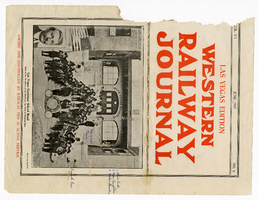"Access to archival materials stored in LASR may be limited at this time."
Search the Special Collections and Archives Portal
Clark, Ed W., 1871-1946
Description
Nevada politician and businessperson Ed W. Clark was a major player in Democratic Party politics in Southern Nevada for over four decades. Clark was born in San Jose, California in 1871, and that same year his mother brought him to Nevada, where she capitalized on the silver mining boom in Pioche. She opened a boarding house for miners, and Clark helped his mother run the boarding house until he was seventeen years old, at which point he started his own cattle business in northern Lincoln County. Later, Clark ran a freight business that transported supplies from Mormon communities in Utah. In the 1890s, he formed a partnership with C. C. Ronnow, and together they operated the Ed W. Clark Forwarding Company, which transported freight from the Union Pacific Railroad to mining communities in Nevada.
Clark's first foray into politics occurred when he won the election for treasurer of Lincoln County. As treasurer, he oversaw several competing railroad claims, which he helped diffuse by winning an appointment as postmaster in Caliente, Nevada. In this role, he formed close relationships with numerous politicians, and by 1905 he had moved Ed W. Clark Forwarding Company to the burgeoning town of Las Vegas. Once there, he helped form Clark County, which broke away from Lincoln County in 1909. He became treasurer of Clark County and later ran the First State Bank alongside John S. Park.
During the discussions about building a dam in the American Southwest, Clark was instrumental in planning the construction of the Hoover (Boulder) Dam on the Colorado River near Las Vegas. He served for 25 years on the interstate commission that helped persuade Congress to place the dam there, and he helped secure water and electricity rights for Nevada. Through careful planning, Clark had put himself in position to become extremely wealthy: he had purchased First State Bank from its original owners and become its president, he still operated the freight business, and in 1924, he had become president of Consolidated Power and Telephone. He had also forged powerful political friendships, including U.S. Senator Key Pittman. These connections helped bring the war industry to Nevada, which bolstered towns like Henderson, and they helped persuade President Franklin D. Roosevelt to visit Las Vegas and Mt. Charleston.
Clark died in April 1946.
Source:
A. D. Hopkins, "Ed Clark," Las Vegas Review-Journal. February 7, 1999. http://www.reviewjournal.com/news/ed-clark

